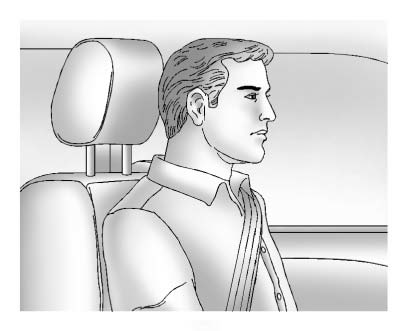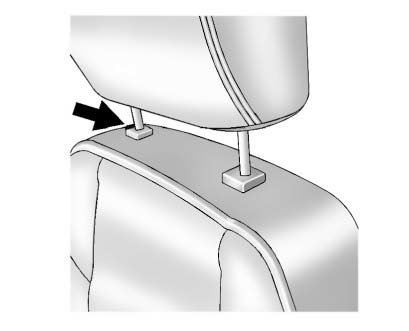Chevrolet Cruze Owners Manual: Head Restraints
The vehicle's front and rear seats have adjustable head restraints in the outboard seating positions.
WARNING
With head restraints that are not installed and adjusted properly, there is a greater chance that occupants will suffer a neck/ spinal injury in a crash. Do not drive until the head restraints for all occupants are installed and adjusted properly.

Adjust the head restraint so that the top of the restraint is at the same height as the top of the occupant's head. This position reduces the chance of a neck injury in a crash.

The height of the head restraint can be adjusted. Pull the head restraint up to raise it. Try to move the head restraint to make sure that it is locked in place.
To lower the head restraint, press the button, located on the top of the seatback, and push the head restraint down. Try to move the head restraint after the button is released to make sure that it is locked in place.
The front seat outboard head restraints are not designed to be removed.
 Front Seats
Front Seats
...
Other materials:
Water Hose Test
Note: Use a water hose without the nozzle attached.
Have an assistant inside of the vehicle i 1. n order to locate the leak.
Begin testing at the base of the window or the windshield.
Slowly move the hose upward and across the top of the vehicle.
...
Air Conditioning Condenser Replacement (1.6L LDE, LXT, LXV, and 1.8L 2H0)
Removal Procedure
Recover the refrigerant. Refer to Refrigerant Recovery and Recharging.
Disconnect battery negative cable. Refer to Battery Negative Cable
Disconnection and Connection.
Remove front bumper fascia. Refer to Front Bumper Fascia Replacement.
Remove air intake duct ...
Specifications
Front Door (Diesel)
65 mm
83 mm
Front Door (Diesel)
60 mm
87 mm
Rear Compartment Lid (Diesel)
122 mm
32 mm
Rear Compartment Lid (Ecoline)
162 mm
32 mm
...

